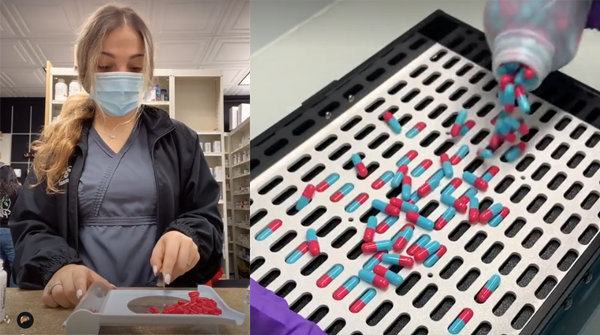A lousy job, listening to pills, unexpected power source, and more
26 Aug 2021
Posted by Andrew Kantor
Boost me too!
Not wanting to be left off the impending vaccine-booster bandwagon, Johnson & Johnson says that a booster shot of its vaccine “generated a rapid and robust increase in spike-binding antibodies” — in fact, after 28 days it was nine times (nine times!) higher than just a single shot.
The sound of pharma
What could be more relaxing than listening to the sound of pharmacy technicians pouring, counting, and bottling pills? Apparently that’s become a thing on TikTok among ASMR enthusiasts. Go figure.

* Autonomous sensory meridian response, or the feeling some people get when listening to certain quiet sounds, like whispering.
A different kind of glucose monitor
Japanese chemists have developed a urine-powered sensor for adult diapers that can monitor blood glucose levels, sending that information to a caregiver via Bluetooth.
In hospitals or nursing care sites, where potentially hundreds of diapers have to be checked periodically, the proposed device could take a great weight off the shoulders of caregivers.
A big IPF breakthrough
If you have a mouse with pulmonary fibrosis, here’s some good news: Venetoclax (the leukemia drug) seems to reverse it — as in the mice ” had normal lung architecture at 21 days and no collagen deposition.” So report medical researchers from the University of Alabama.
In humans, idiopathic pulmonary fibrosis is usually fatal within three to five years, so this could be pretty darned big news for the 50,000 or so Americans who get it each year.
Cholesterol powers cancer
Poor cancer — metastasizing is stressful. Most cells die from the stress, in fact (it’s called ferroptosis), but one way Duke biologists found cancer cells reduce that stress is by using cholesterol. The ones that survive are “impervious to death as they migrate from the original tumor site.”
Bottom line (and more research is, of course, needed): High cholesterol means not only an increased risk of cancer, but a greater chance that it will metastasize.
Today’s vaccine effectiveness data
The latest CDC data, which (finally) takes into account the delta variant, shows that yep, Covid-19 vaccines lose effectiveness — dropping from about 91% effective at first to 66% percent after six months.
This takes into account all three vaccines, and it was based on 3,483 frontline health workers across eight states. It jibes with a similar study out of Britain.
The good news: Even 66% protection is still pretty good, and protection against serious illness is much higher.
Lousy news
As school opens (and closes, and opens again), the good folks at Drug Topics have a timely bit of strategy for you: “Vital Information for Pharmacists to Increase Head Lice Awareness and Education.”
“As pharmacists, we’re in the perfect position to rid patients of these misconceptions and to educate them about head lice, take away the stigma surrounding it, and help them manage it.”
The long dark teatime of the brain
A pretty big British study (more than 81,000 people) found that “Covid-19 infection is associated with cognitive deficits that persist into the recovery phase.” Whether or not someone was hospitalized, there’s a good chance they’ll experience “cognitive problems” long after recovery.
Questions remaining: How long do these “deficits” last, and what exactly causes them? For the latter, at least, the authors say brain imaging will be needed.
ICYMI: Delta news (the airline, not the virus)
Unlike other airlines, Delta is not requiring employees to get a Covid vaccine … but those who refuse it will pay an extra $200 a month toward their health insurance premiums. The company, it should be noted, self-insures its employees.
And, starting September 30, unvaccinated employees will have to take sick leave if they contract Covid-19. (Those with breakthrough infections are covered by ‘Covid pay protection.’)
* If you’re wondering whether the Affordable Care Act allows this, join the club. I guess we’ll find out soon.
The Long Read: What Took So Long? edition
With millions of people getting their shots, why did the FDA take so long to give full approval to Pfizer’s vaccine? The Atlantic explains “The FDA Really Did Have to Take This Long“.


